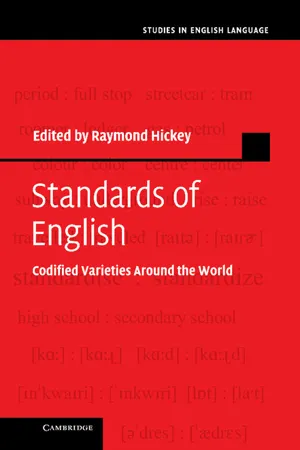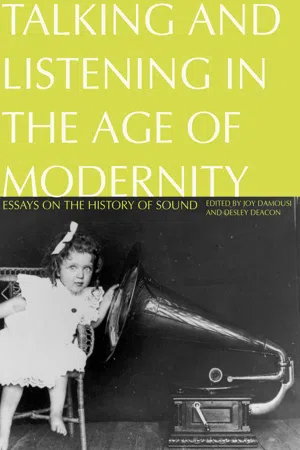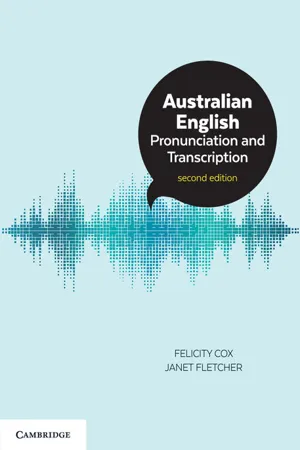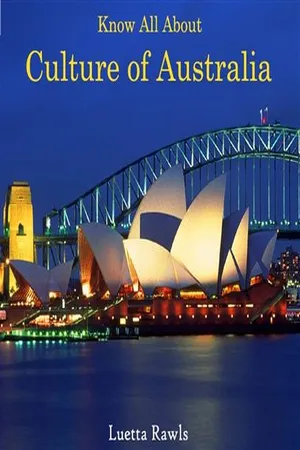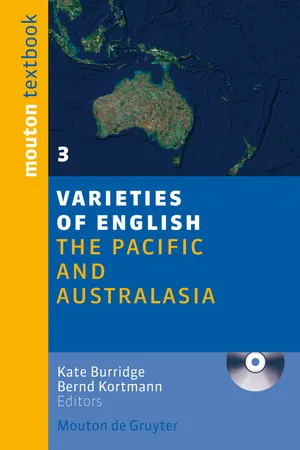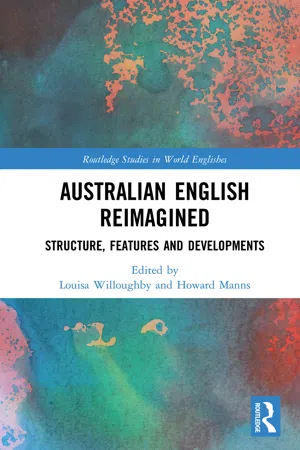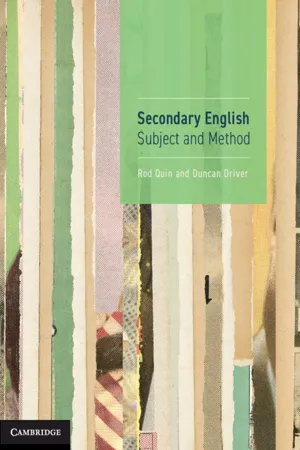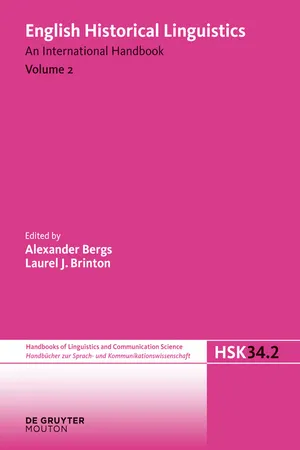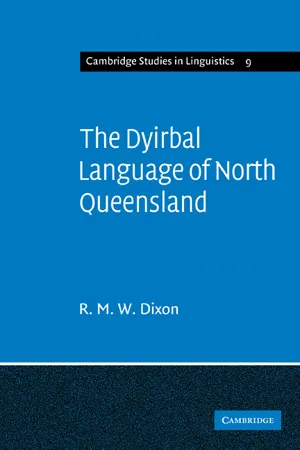Languages & Linguistics
Australian English
Australian English refers to the variety of English spoken in Australia, characterized by its unique accent, vocabulary, and expressions. It has been influenced by British English, Aboriginal languages, and various immigrant languages. Australian English reflects the country's diverse cultural and linguistic heritage, and it continues to evolve through ongoing interactions with other English-speaking countries and global influences.
Written by Perlego with AI-assistance
Related key terms
1 of 5
10 Key excerpts on "Australian English"
- eBook - PDF
Standards of English
Codified Varieties around the World
- Raymond Hickey(Author)
- 2012(Publication Date)
- Cambridge University Press(Publisher)
Australia does, however, remain over- whelmingly Anglo-dominant, with 83 per cent of the population speaking only English at home (ABS 2006a: 43). The vast majority of speakers use AusE as their native language as this is the variety of those who are born and/or raised in Australia and it remains a powerful symbol of Australian national identity. Variations that occur within this national variety serve the dual social function of symbolising sociodemographic as well as ethnocultural group membership (Collins and Blair 2001:11). Thanks to Chris Callaghan, Linda Buckley, Greg Flannery and Scott Barnes. This work was supported by Macquarie University Research Development grant 9200900671. Standard Australian English 295 Amongst AusE speakers, we can identify three main subgroups: Standard Australian English is used by the majority (Cox and Palethorpe 2007); Australian Aboriginal English is used by many indigenous Australians (Butcher 2008); and various ethnocultural varieties which exist as an expres- sion of non-mainstream or ethnic identity in the Australian context (Clyne, Eisikovits and Tollfree 2001). Standard Australian English is the form represented in the national dictionaries such as the Macquarie Dictionary (2009) and the Australian Oxford Dictionary (Moore 2004). It is also codified in style and usage guides (e.g. Peters 2007) and is the variety of education, government institutions, the courts, broadcasting and trade. In this chapter we will concentrate our attention on Standard Australian English phonology with particular focus on the vowel sounds. However, it is pertinent to add that there are a number of aspects of AusE morphosyntax and, of course, lexicon that make it unique among the dialects of English. One such element of morphosyntax is the predilection for the productive use of hypocoristics, particularly those that are formed by the suffixes -ie and -o (as in mozzie for mosquito, and ambo for ambulance officer). - eBook - PDF
Talking and Listening in the Age of Modernity
Essays on the history of sound
- Joy Damousi, Desley Deacon, Joy Damousi, Desley Deacon(Authors)
- 2007(Publication Date)
- ANU Press(Publisher)
the government report National Policy on Languages stated: ‘Australian English is a dynamic but vital expression of the distinctiveness of Australian culture and an element of national identity.’ 75 In 1988, there appeared The Australian National Dictionary: A Dictionary of Australianisms on Historical Principles , edited by W. S. Ramson. In 1992, at a conference on the languages of Australia, David Blair argued: ‘Australian English is currently a self-confident dialect, reasonably secure in itself, and prepared to set its own standards. It is confident enough to be open to outside cultural influences, as is the society in which it functions.’ 76 Australian English was finally naturalised—and, as if as a consequence of this naturalisation, the two extremes, cultivated and broad Australian, were on the decline. Since the 1970s, cultivated Australian has lost its former status, and such an accent is more likely to be a hindrance than an advantage in contemporary Australia. Broad Australian is rarely heard, except when consciously ‘cultivated’ for its advertising or iconising functions—perhaps a reflection of the changing demographics of Australian society, perhaps an admission that its opposing partner, cultivated, is now devoid of power. The wheel has turned full circle. Most Australians now speak general Australian, or, more accurately, Australian—something very similar to the foundation accent of the 1820s. ENDNOTES 1 Board, Ruby W. 1927, Australian Pronunciation: A Handbook for the Teaching of English in Australia , Government Printer, Sydney, p. 6. 2 Ellis, A. J. 1869, On Early English Pronunciation , vol. 1, Trübner, London, p. 23. 3 Wellings, Ben 2005, ‘Crown and Country: empire and nation in Australian nationalism, 1788–1999’, Journal of Australian Colonial History , 5 (2005), pp. 148–70 at p. 170. 4 Mallarky, Edith M. 1914, ‘Some Means of Training in Speech and other Papers’, Records of the Education Society , Government Printer, Sydney, p. - eBook - PDF
The Amazing World of Englishes
A Practical Introduction
- Peter Siemund, Julia Davydova, Georg Maier(Authors)
- 2012(Publication Date)
- De Gruyter Mouton(Publisher)
INNER CIRCLE VARIETIES OF ENGLISH 142 REadInG ComPREHEnSIon Group work: Australian English The English language as used in Aus-tralia […] has a short history, reflecting some 200 years of European settlement, and an even shorter period of recogni-tion as a national variety, the term [Aus-tralian English (=AusE)] being first re -corded in 1940. It is only since then that features of AusE have been regarded as distinctively and respectably Austral-ian, instead of as evidence of colonial decline from the norms of the STANDARD ENGLISH of England. Background . Initially, and unique-ly, a majority of the British colonies in Australia were penal. As they expanded and as free colonies were developed, immigrants using languages other than English were insignificant . Relations with the Aborigines were generally poor and after an initial intake of words from their languages (such as boomerang , dingo , kangaroo , koala , kookaburra , wombat ) were not conducive to exten-sive borrowing . The settlers were al-most all Anglo-Celtic and geographical isolation was of great importance. The preoccupations of the colonists were the discovery and exploration of a new land, rich in exotic flora and fauna, and pastoral occupations such as raising sheep and cattle under circumstances vastly different from ‘the Old Country’. In the late 20c, however, Australians are predominantly urban and increasingly multicultural. The major areas of lexical growth are international, as in comput-ing and surfing. In the 19c, the situation was reverse. Pronunciation . The most marked feature of the Australian accent is its homogeneity , with no regional differ-ences as marked as those in BrE and AmE, though recent studies have as-sociated particular phonological char-acteristics with state capitals. There is, however, a social continuum in which three varieties are generally recognized: Broad Australian , General Australian , and Cultivated Australian . - Felicity Cox, Janet Fletcher(Authors)
- 2017(Publication Date)
- Cambridge University Press(Publisher)
AusE is increasingly considered an influential new variety of orientation in East Asia (Leitner 2004, Foulkes 2006). Australia is a diverse multicultural society, with more than 48 per cent of its inhabitants either born overseas or with at least one parent born overseas (ABS 2016a). This cultural mix has led to considerable linguistic diversity within the Australian community, with over 300 different languages spoken, including some robust and flourishing Indigenous languages, but many others that are critically endangered (ABS 2016b, Marmion, Obata & Troy 2014). Despite the multicultural nature of the society, Australia remains overwhelmingly Anglo-dominant, with 79 per cent of the population speak- ing only English at home (ABS 2017). Amongst AusE speakers, there are three major dialect types: Standard (Mainstream) Australian English, used by the majority; Australian Abo- riginal Englishes, used by many Indigenous Australians (Butcher 2008); Introduction to Australian English speech production 11 and Ethnocultural Australian English, which are forms used to express non-mainstream or ethnic Australian identity (Clyne, Eisikovits & Tollfree 2001). The label ‘Australian English’ should be considered a superordinate term that embraces all of these various dialectal types. Standard (Main- stream) Australian English is the codified variety represented in the national dictionaries such as the Macquarie Dictionary (2013) and the Australian Oxford Dictionary (2004), and is the variety used in education, government, the courts, broadcasting and trade. Throughout this text the abbreviation AusE will be used to refer to Standard (Mainstream) AusE. The term when used to describe accent does not refer to notions of correctness or prestige. Other AusE varieties can be represented by the same set of phonemic symbols used here but some of the phonetic detail may differ.- No longer available |Learn more
- (Author)
- 2014(Publication Date)
- Learning Press(Publisher)
This, too has affected Australian English. Variation and changes Three main varieties of Australian English are spoken according to linguists: broad , general and cultivated . They are part of a continuum, reflecting variations in accent. They often, but not always, reflect the social class or educational background of the speaker. Broad Australian English is recognisable and familiar to English speakers around the world because it is used to identify Australian characters in non-Australian films and television programs (often in the somewhat artificial stage Australian English version). Examples are film/television personalities Steve Irwin and Paul Hogan. Slang terms ocker , for a speaker, and Strine , a shortening of the word Australian for the dialect, are used in Australia. The majority of Australians speak with the general Australian accent. This predominates among modern Australian films and television programs and is used by, for example, Eric Bana, Dannii Minogue and Hugh Jackman. Cultivated Australian English has some similarities to British Received Pronunciation, and is often mistaken for it. Cultivated Australian English is spoken by some within Australian society, for example Cyril Ritchard and Judy Davis. There are no strong variations in accent and pronunciation across different states and territories. Regional differences in pronunciation and vocabulary are small in comparison to those of the British and American English, and Australian pronunciation is determined less by region than by social, cultural and educational influences. There is some subtle regional variation. ________________________ WORLD TECHNOLOGIES ________________________ Phonology Australian monophthongs ________________________ WORLD TECHNOLOGIES ________________________ Australian diphthongs Australian English is a non-rhotic accent and it is similar to the other Southern Hemisphere accents (New Zealand English and South African English). - eBook - PDF
- Kate Burridge, Bernd Kortmann(Authors)
- 2008(Publication Date)
- De Gruyter Mouton(Publisher)
Regional characteristics of Australian English: phonology David Bradley 1. Introduction The regional phonological characteristics of Australian English are much more subtle than those in the British Isles or North America, but they exist and are continuing to develop. As the contribution to this volume by Horvath indicates, these regional differences are much less substantial than the pervasive socio-lectal differences. The regional differences are especially in vowel realisations, as is usual throughout English, but also in a few areas of consonant realisations. Australian speakers are much less aware of most of them than they are of the substantial sociolectal differences, though some speakers are aware of some of the most salient regional differences. Most older scholarly sources, following Mitchell and Delbridge (1965), state that there are no such differences. This is increasingly the subject of derisive comment by popular commentators on language, for example Buzo (2002). 2. Vowel characteristics 2.1. Variation between [æ] and [a ˘ ] The clearest example of a regional difference which is stereotyped (known to many non-linguists) is in the BATH vowel class. For most lexical items in Aus-tralian English of all regional and social varieties, the distribution of the earlier TRAP vowel between the modern PALM and TRAP vowels generally follows the southeastern British pattern: mainly PALM before / f , s , T /, variable before nasal plus obstruent – more so in Australia than in England – and mainly TRAP elsewhere. As is well-known, there are exceptions both ways in southeastern British English and in Australian English, such as gas with TRAP and the sec-ond syllable of banana with PALM , and some forms such as plastic and the prefix trans-still vary in Britain. - eBook - ePub
Australian English Reimagined
Structure, Features and Developments
- Louisa Willoughby, Howard Manns, Louisa Willoughby, Howard Manns(Authors)
- 2019(Publication Date)
- Routledge(Publisher)
The Cambridge history of the English language , vol. 3, 1476–1776. Cambridge: Cambridge University Press. doi:10.1017/CHOL9780521264761.- Leitner, Gerhard. 2004a. Australia’s many voices. Vol. 1: Australian English – The national language . Berlin: Mouton de Gruyter.
- Leitner, Gerhard. 2004b. Beyond Mitchell’s views on the history of Australian English. Australian Journal of Linguistics 24. 99–126. doi:10.1080/0726860032000203227.
- Lin, Susan, Sallyanne Palethorpe & Felicity Cox. 2012. An ultrasound exploration of Australian English /CVl/ words. Proceedings of the 14th Australasian International Conference on Speech Science and Technology , 105–108.
- Liu, Shuting. 2016. The effect of vowel duration on native Mandarin listeners’ perception of Australian English vowel contrasts in voiced and voiceless coda contexts . Sydney: Macquarie University. (Unpublished master’s thesis).
- Loakes, Deborah & Kirsty McDougall. 2010. Individual variation in the frication of voiceless plosives in Australian English: A study of twins’ speech. Australian Journal of Linguistics 30. 155–181. doi:10.1080/07268601003678601.
- MacMahon, Michael. 1998. Phonology. In Suzanne Romaine (ed.), The Cambridge history of the English language , vol. 4, 373–535. Cambridge: Cambridge University Press. doi:10.1017/CHOL9780521264778.006.
- Meakins, Felicity & Carmel O’Shannessy. 2016. Loss and renewal: Australian languages since colonisation . Boston: de Gruyter.
- Milroy, James. 2001. Received pronunciation: Who “receives” it and how long will it be “received”? Studia Anglica Posnaniensia 36 15–33.
- Mitchell, Alexander. 1946. The pronunciation of English in Australia . Sydney: Angus & Robertson.
- Mitchell, Alexander & Arthur Delbridge. 1965. The speech of Australian adolescents: A survey . Sydney: Angus & Robertson.
- Moore, Bruce. 2008. Speaking our language: The story of Australian English . Melbourne: Oxford University Press.
- Oasa, Hiroaki. 1989. Phonology of current Adelaide English. In Peter Collins & David Blair (eds.), Australian English: The language of a new society
- eBook - PDF
Secondary English
Subject and Method
- Rod Quin, Duncan Driver(Authors)
- 2020(Publication Date)
- Cambridge University Press(Publisher)
In this book we use the term in accordance with the descriptions provided by Crystal (2003) and Hickey (2012). Our usage is also consistent with that of the 2014 Australian Curriculum for English. Standard English is the variety of national English used in interactions of a serious nature or where the participants do not know each other very well or wish to maintain a degree of social distance. It is commonly used in government administration, business, academia and serious media, such as news reports aimed at a wide audience. The national standard is the basis for most written communication, with some exceptions such as letters or emails among friends and family, and literature deliberately written in dialect. Because of the contexts in which it is used, the national standard is often seen as a lan- guage of prestige and power. Although it is widely understood, the national standard is spoken by very few people outside formal contexts. For most people the national standard is an additional variety of English used only in certain situations. Varieties of Australian English There is little significant regional variation within Australian English but there are some important contextual and social varieties. These include standard Australian English SECONDARY ENGLISH 38 (SAE), colloquial Australian English (CAE), Aboriginal Australian English (AAE) and ethnocultural varieties (immigrant English). Standard Australian English Standard Australian English (SAE) is the formal variety of Australian English. Like other national standards, it tends to be used in interactions of a serious nature or where the participants do not know each other very well. SAE is not associated with a particular accent; it can be spoken in a variety of accents, as successive Australian Prime Ministers have demonstrated. - eBook - PDF
- Alexander Bergs, Laurel J. Brinton, Alexander Bergs, Laurel J. Brinton(Authors)
- 2012(Publication Date)
- De Gruyter Mouton(Publisher)
Varieties of English: Australian/New Zealand English 2007 from the ONZE project (Gordon et al. 2004: 172–174). Data from this project add to the picture of the historical development in other areal phenomena: Schreier et al. (2003) show that the distinction between which (with initial /hw/) and witch was maintained longer in areas with substantial Scottish dialect input at the beginning of the 20th century. Incipient regionalization in the New Zealand lexicon has been studied by Bauer and Bauer (e.g. 2000, 2002, 2005) on the basis of questionnaire data distributed to primary schools across the country, which indicates the development of a northern dialect area in the North Island and differences between the North and South Island. As is to be ex-pected, regionalization in the North shows overlap with social and ethnic variation (see Bauer and Bauer 2000). Another study (Ainsworth 2004) found regional variation in into-nation patterns within New Zealand (i.e. between the Taranaki and Wellington regions). In a globalized world, migration continues to affect both Australia and New Zealand and it is therefore questionable whether substantial and stable regional variation is likely to develop. 6 Summary Historical linguistics of English in Australia and New Zealand has largely concentrated on accent and vocabulary, so far. Grammatical regionalisms (in the form of preferences for options also available in other varieties of English) have mainly been studied synchro-nically. Future research will have to map the minutiae of differential grammatical change in the two varieties. But even the large body of available evidence for the development of the distinctive AusE and NZE accents and lexicon is far from conclusive (see the unre-solved controversy on the origins of the NZE accent). - eBook - PDF
- R. M. W. Dixon(Author)
- 1972(Publication Date)
- Cambridge University Press(Publisher)
I Australian languages This chapter surveys, rather briefly, some of the recurring linguistic features of languages across the continent. It does not purport to be a complete ' Handbook of Australian languages' and does not attempt to list the many individual variations from the basic pattern. Further details on some of the points mentioned below will be found in the surveys by Schmidt, Ray [1925], Capell and Wurm. Schmidt [1912, 1919] draws some intelligent conclusions from the rather scanty and inaccurate published material then available. Capell [1956] gives a great deal of important information, much of it based on his own field work; but even in 1956 far less was known about Australian languages than today and some of CapeH's data is, for instance, phonetically suspect. Wurm's [forthcoming] readable survey essentially repeats and expands some of Capell's ideas, and includes a lexicographic classification of Australian languages (see 10.1). 1.1 General There were perhaps 600 aboriginal tribes in Australia at the time of the European invasion at the end of the eighteenth century [Tindale, 1940]. Each tribe spoke a distinct dialect, which usually had considerable lexical and grammatical similarities to neighbouring dialects. The existence of extensive dialect chains makes it difficult to put an exact figure on the number of distinct aboriginal languages; recent guesses have been that there were about 200 [Wurm, 1965; O'Grady et al., 1966]. On the basis of the similarities summarised below it has for some time seemed likely that at least the majority of Australian languages are genetically related. But, although there have been two excellent essays at phonological reconstruction over smallish areas - Hale's [1964] work on languages at the north of the Cape York Peninsula, and O'Grady's [1966] on the Pilbara region-as yet little has been done towards reconstructing proto-Australian (but see Dixon [forthcoming- b]).
Index pages curate the most relevant extracts from our library of academic textbooks. They’ve been created using an in-house natural language model (NLM), each adding context and meaning to key research topics.
